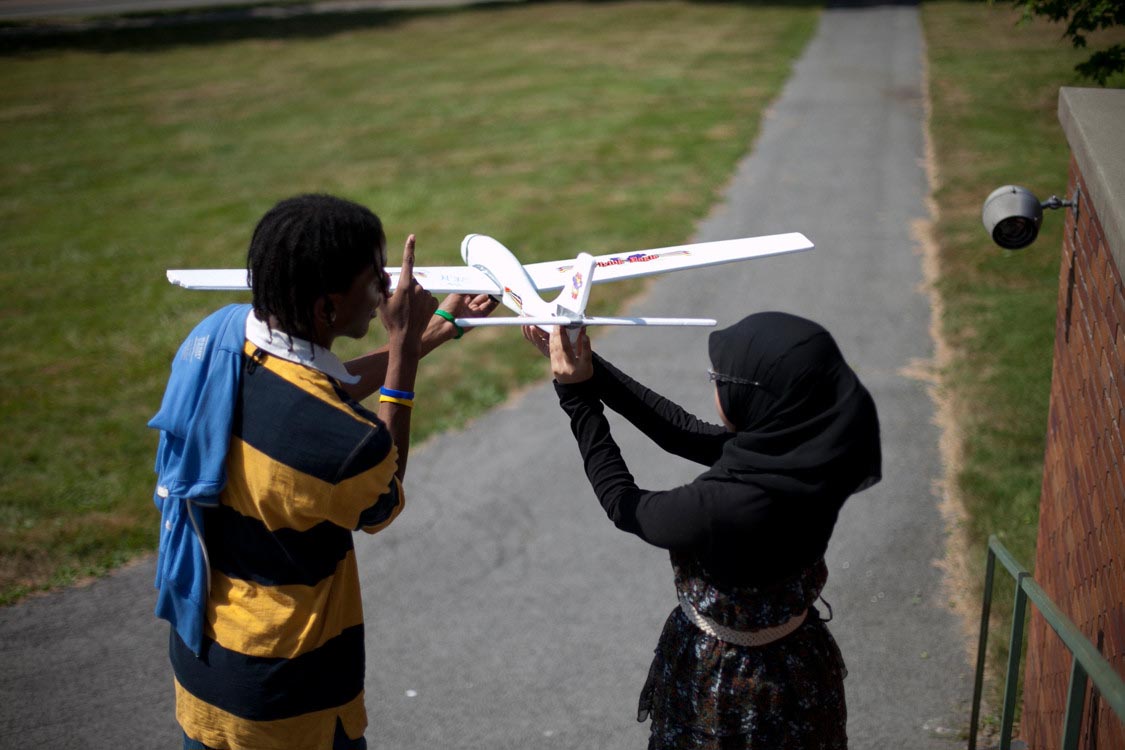Cornell partners on 4-H National Youth Science Day
By Ted Boscia

When an expected 100,000 children and teens participate in the nation’s largest youth science event this fall, they’ll make hands-on discoveries using educational kits and guides developed by a Cornell team composed of campus and county partners.
On 4-H National Youth Science Day (4-H NYSD), Oct. 5, young people in cities and towns nationwide will undertake an interactive engineering design challenge created by Cornell Cooperative Extension (CCE) in partnership with National 4-H Council.
The program, Drone Discovery, explores the science behind unmanned flight and how remote sensing and drone technologies can be applied to address community needs, such as tracking the spread of an invasive plant species, monitoring a city’s solar energy grid or searching for lost people or pets.
Cornell plans to mark 4-H NYSD by hosting Drone Discovery events with New York City schoolchildren Oct. 7, followed by a campus event with Tompkins County youth Oct. 21.
Conducting experiments with adult facilitators, participants will use foam gliders and keychain cameras to design, build and test drone models, and code flight paths for real-world scenarios. Participants will learn everything from flight dynamics and aircraft types, to drone safety and regulations, to remote sensing and flight control, while piquing their interest in STEM (science, technology, engineering and mathematics) careers and concepts.
“4-H is a powerful vehicle for STEM education because it is based on what young people are interested in, allowing them to take an active role in their learning,” said project leader Alexa Maille, state 4-H STEM program specialist in the Bronfenbrenner Center for Translational Research (BCTR) in the College of Human Ecology. “Drone Discovery will provide youth an outlet to practice thinking like scientists and engineers, as well as engaged citizens, as they explore cutting-edge technology. This project will foster a sense of discovery in youth all around the country.”
National 4-H Council selected Cornell as the partner for 4-H NYSD this spring after a competition among land-grant institutions. Across New York’s 57 counties and New York City’s boroughs, approximately 190,000 youth annually participate in 4-H programs offered by schools, local clubs, camps and other locations – a youth development network underpinned by Cornell expertise. Administered by the BCTR, New York state 4-H acts as the youth component of CCE, focusing on helping young people to grow in the areas of STEM, healthy lifestyles and citizenship.
Andy Turner, New York state 4-H leader, credited Cornell’s work on 4-H NYSD to an “active and creative STEM team already doing innovative work.”
In addition to Turner and Maille, Cornell’s core 4-H NYSD planning group includes Susan Hoskins, a senior extension associate in soil and crop sciences, along with youth development leaders at CCE-New York City and CCE-Broome County.
“The project will demonstrate Cornell’s strengths in STEM in the 4-H program, and fits beautifully with the goal of reaching 10 million youth via 4-H across the nation by 2025, up from the current reach of 6 million,” Turner added. “Hands-on, STEM-oriented projects like this have the potential to help thousands of youth think about science in a different way, perhaps helping many of them to start on a pathway that can lead to a promising career.”
Hoskins, an expert in geographic information system mapping and remote sensing who has used these technologies for agricultural research, has a long history teaching geospatial science to 4-H youth. As drones and other unmanned aerial vehicles become commonplace, she imagines broad possibilities for children and teens to discover the science and applications of drones and consider the ramifications for society.
“Drone Discovery offers a great opportunity for youth engagement by introducing them to emerging fields and inspiring them toward academic and career paths that will arise from these new technologies,” Hoskins said. “All of the lessons are grounded in the real world, too, so the program encourages active citizenship as our society prepares to take on rapidly evolving questions about drone regulations and policies.”
Hoskins will pilot the Drone Discovery curriculum with youth on campus June 28-30 for 4-H Career Explorations, an annual event expected to draw 380 youth from around the state to explore STEM fields.
Ted Boscia is director of communications and media for the College of Human Ecology.
Media Contact
Get Cornell news delivered right to your inbox.
Subscribe